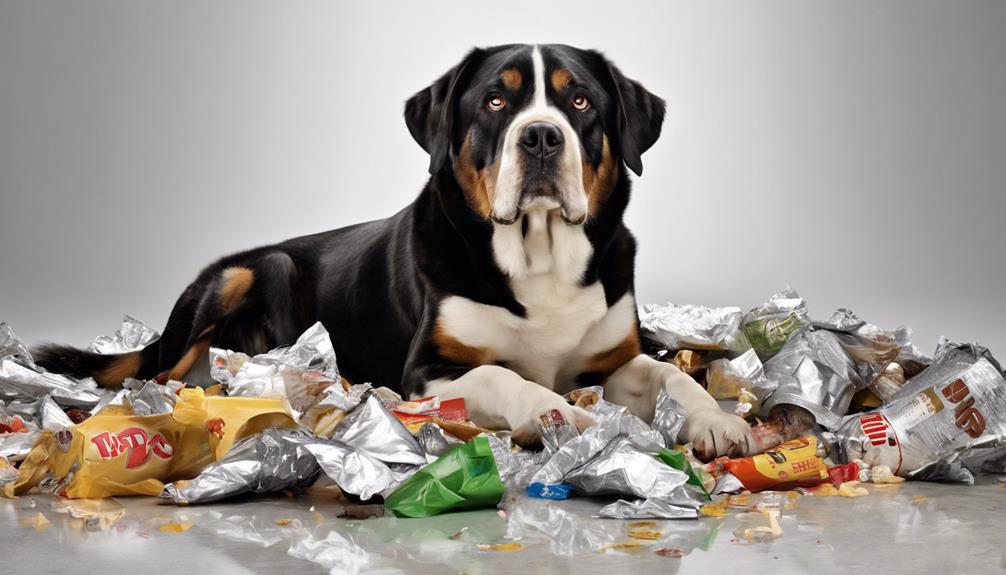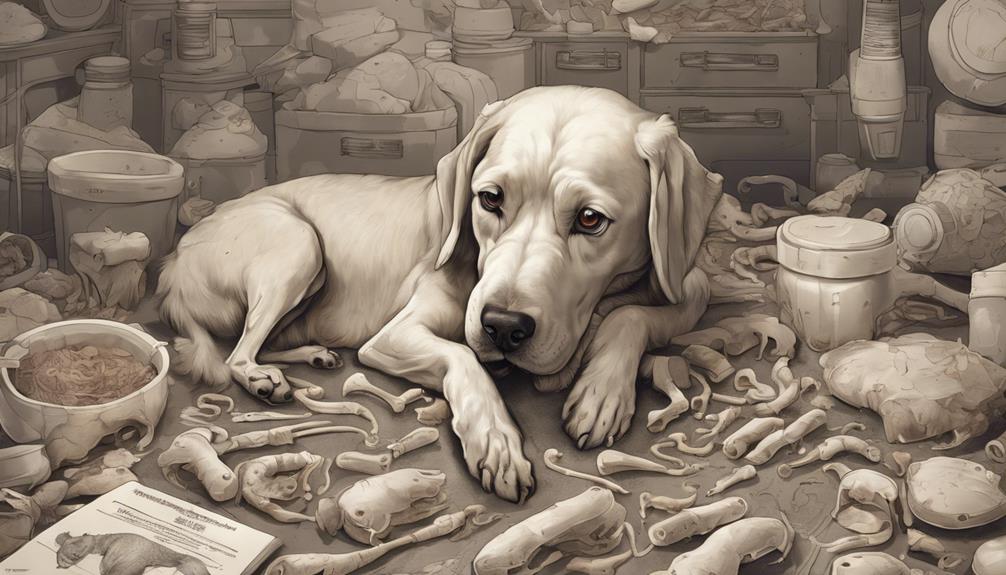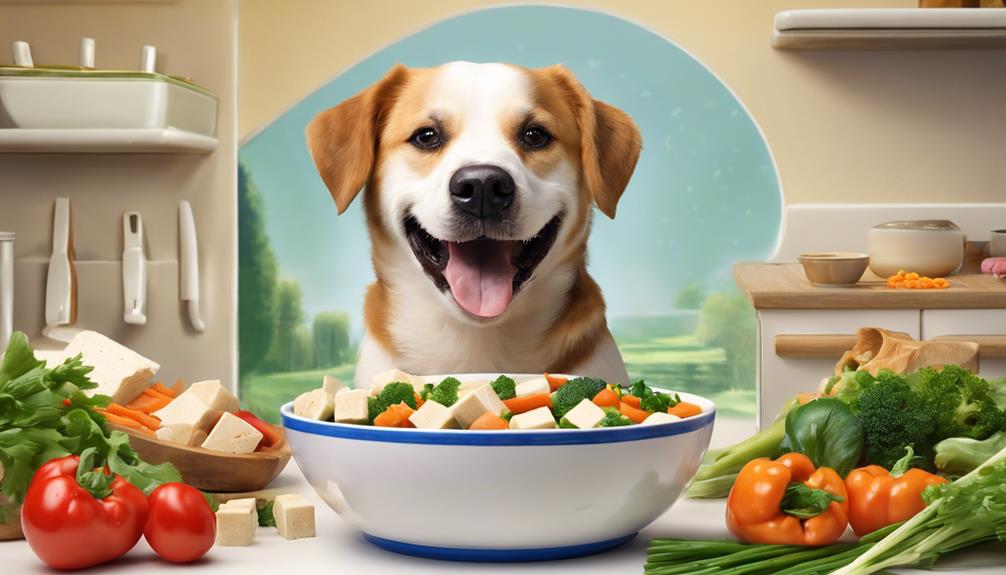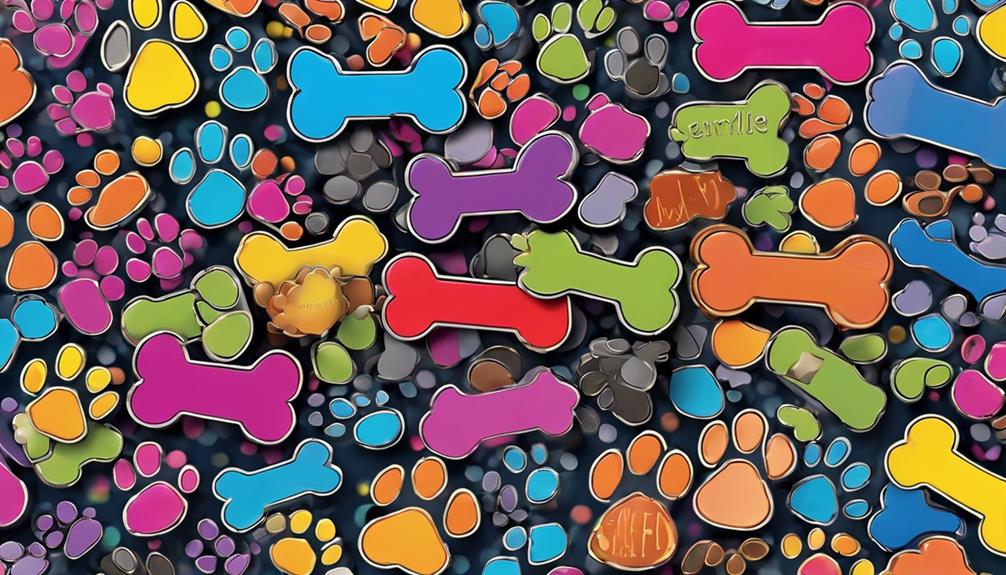If our dog has diarrhea, it may be caused by different factors. Changes in diet, consuming disagreeable substances, and even food allergies can lead to loose stools, vomiting, and other symptoms. Infections such as parvovirus, parasites, or intestinal disorders could also be to blame.
If the issues persist, seeking veterinary help is essential to identify the exact cause and provide appropriate treatment. Understanding these causes is vital for our dog's health and comfort.
Key Takeaways
- Dietary changes, infections, parasites, and intestinal disorders are common causes of dog diarrhea.
- Food allergies, spoiled food, and abrupt diet changes can trigger diarrhea in dogs.
- Infections like parvovirus and parasites like Giardia can lead to diarrhea in dogs.
- Stress and changes in routine can disrupt hormone balance and cause diarrhea in dogs.
- Veterinary assistance is crucial for accurate diagnosis and treatment of dog diarrhea.
Common Causes of Dog Diarrhea
Vital causes of dog diarrhea often stem from dietary changes or the ingestion of disagreeable substances. When our furry friends experience diarrhea, it can be a worrisome and uncomfortable ordeal for both them and us. The symptoms are usually quite apparent – frequent loose or watery stools, straining to defecate, vomiting, lethargy, and sometimes blood in the stool. It's imperative to understand that diarrhea in dogs can be caused by a variety of factors, ranging from mild issues like dietary indiscretions to more severe conditions like infections or underlying health problems.
While some cases of diarrhea may resolve on their own, it's important to monitor your dog closely and seek veterinary help if the symptoms persist for more than a day or two, or if they're accompanied by other concerning signs. Your vet may recommend medications, dietary changes, or further diagnostic tests to determine the exact cause of your dog's diarrhea and provide appropriate treatment. Remember, prompt attention and care can help alleviate your dog's discomfort and safeguard their health and well-being.
Dietary Indiscretions and Allergies

When dogs consume inappropriate or allergenic substances, it can lead to gastrointestinal disturbances such as diarrhea. Here are some key points to keep in mind when understanding dietary triggers for diarrhea in dogs:
- Food Allergies: Dogs can develop diarrhea as a result of food allergies, where certain ingredients provoke an immune response leading to gastrointestinal upset.
- Spoiled Food: Consumption of spoiled or contaminated food can cause diarrhea in dogs due to bacterial overgrowth or toxins present in the food.
- Abrupt Diet Changes: Suddenly altering your dog's diet, whether by shifting to a new brand of food or introducing new ingredients, can disrupt their digestive system and result in loose stools.
- Toxic Foods: Foods like chocolate, onions, garlic, and grapes are poisonous to dogs and can cause digestive issues, including diarrhea.
Identifying and managing specific dietary triggers, avoiding toxic foods, and gradually shifting to new diets can help prevent and alleviate diarrhea in dogs.
Infections and Parasites
Infections and parasites pose significant risks to dogs, potentially leading to gastrointestinal disturbances such as diarrhea. Common culprits include parvovirus, distemper, and bacterial infections, all of which can trigger diarrhea in our furry companions. Additionally, parasites like Giardia, hookworms, and roundworms are known to cause gastrointestinal issues and diarrhea in dogs.
When infections or parasites are the root cause of diarrhea, dogs may experience severe symptoms such as dehydration. It's important to adhere to regular deworming and vaccination schedules to help prevent these infections and parasitic infestations that can lead to diarrhea. Seeking veterinary assistance is essential for accurate diagnosis and treatment.
Veterinary testing is often required to pinpoint the specific infection or parasite causing the diarrhea, enabling targeted treatment and a quicker recovery for our beloved pets. Remember, early detection and intervention are key to ensuring our dogs' health and well-being when facing infections or parasites.
Intestinal Disorders and Diseases

What symptoms can indicate the presence of intestinal disorders and diseases in dogs? Here are some key indicators to watch for:
- Inflammatory Bowel Disease (IBD): Dogs with IBD may experience chronic diarrhea, often accompanied by weight loss and vomiting.
- Intestinal Parasites: Infestations of parasites like giardia or worms can lead to diarrhea, which may contain blood or mucus.
- Pancreatitis and Colitis: Conditions such as pancreatitis and colitis can cause gastrointestinal upset, resulting in diarrhea with varying degrees of severity.
- Bacterial Gastroenteritis: Infections from bacteria can trigger acute diarrhea in dogs, often with additional symptoms like fever and lethargy.
Each of these factors can contribute to gastrointestinal issues in dogs. Monitoring your dog's bowel movements and overall health closely is crucial, as chronic diarrhea or persistent gastrointestinal upset could signal an underlying problem that requires veterinary attention.
Additionally, conditions like kidney or liver issues can also manifest as diarrhea, underscoring the importance of timely diagnosis and treatment.
Stress and Other Factors
Moving from the discussion on intestinal disorders and diseases in dogs, stress and other factors play a significant role in triggering diarrhea in canine companions. Stress can disrupt the delicate balance of hormones in a dog's body, affecting the gastrointestinal system and leading to diarrhea. Changes in routine, environment, or social interactions can all contribute to stress-induced diarrhea in dogs.
Anxiety, fear, and separation from their owners or familiar environments can also play a part in causing digestive upset and diarrhea in dogs. Fortunately, stress-related diarrhea can be managed through various techniques such as behavior modification, environmental enrichment, and implementing calming strategies.
Frequently Asked Questions
Do Dogs Sometimes Get Diarrhea for No Reason?
Yes, dogs can sometimes get diarrhea for no obvious reason. Factors like stress, dietary changes, or minor lapses can trigger this problem. Typically, these episodes resolve on their own.
Monitoring your dog's condition is vital. If the diarrhea continues or is accompanied by concerning symptoms, seeking advice from a veterinarian is recommended. It's important to safeguard your dog's well-being and address any health concerns promptly.
What to Do if Your Dog Has Diarrhea but Is Acting Normal?
If your dog has diarrhea but is acting normal, it could indicate a minor tummy problem. Keep an eye out for other symptoms like vomiting or weakness. Ensure your furry friend stays hydrated and try a bland diet.
If the situation continues or worsens, it's wise to seek advice from a vet for proper care. Remember, our pups' well-being is a top priority, so prompt attention to their health is essential.
At What Point Should I Be Worried About My Dog Having Diarrhea?
If our dog experiences diarrhea, we should be concerned if it persists or worsens over a day, especially if accompanied by signs like blood in the stool, weakness, or dehydration.
Straining to pass watery stool might suggest a potential blockage needing urgent attention.
Monitoring for these symptoms and seeking prompt veterinary care can aid in managing any underlying health issues effectively.
What if My Dog Has Diarrhea but Still Eating and Drinking?
If our dog has diarrhea but is still eating and drinking, it could be due to mild gastrointestinal upset from dietary indiscretion or stress. Though appetite and hydration are important signs, underlying issues like infections or parasites could be present.
Monitoring for additional symptoms like vomiting, weakness, or blood in stool is essential. Providing a bland diet and ensuring access to fresh water can help.
Consulting a veterinarian is recommended to rule out serious causes and determine the best course of action.
Can Toxic Foods for Dogs Cause Diarrhea?
Yes, toxic foods for dogs can cause diarrhea. Certain foods like chocolate, grapes, and onions are toxic to dogs and can lead to gastrointestinal issues such as diarrhea. It’s important for pet owners to be aware of what foods are harmful and to keep them out of reach of their furry friends.
Conclusion
So, next time your furry friend is experiencing some explosive bowel movements, remember that there could be a multitude of reasons behind it. From dietary indiscretions to stress, the causes of dog diarrhea are vast and varied.
It's a real crapshoot trying to figure out what's causing all the mess, but with a little detective work and maybe a trip to the vet, you'll hopefully get to the bottom of it.









